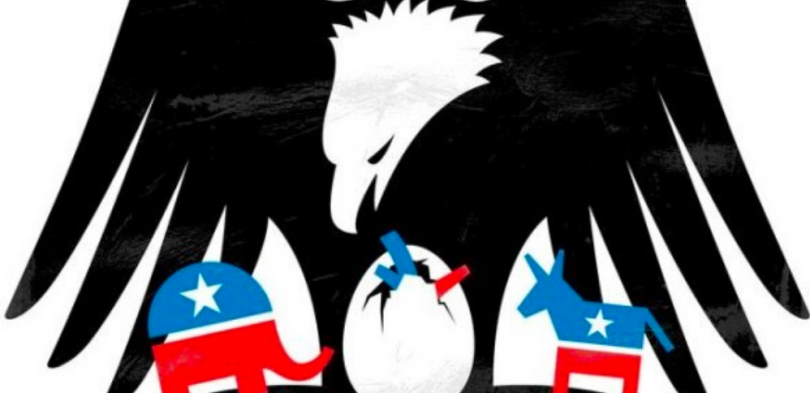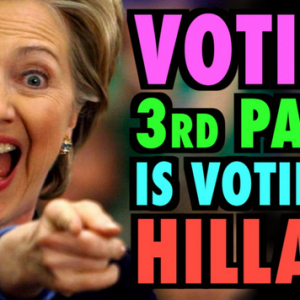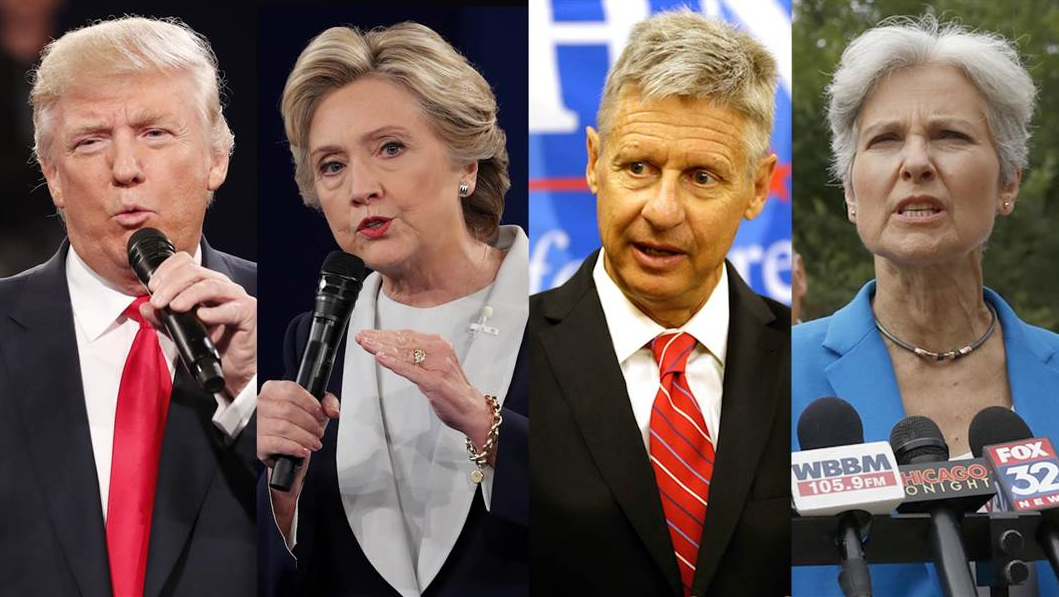aNewDomain commentary — Everyone needs to stop blaming third party voters for Donald Trump’s presidential election upset.
— Everyone needs to stop blaming third party voters for Donald Trump’s presidential election upset.
Yes, I’ve seen the stats: About 4.7 million Americans voted for third-party candidates Gary Johnson and Jill Stein on Election Day, not counting the tens of thousands of votes that went to relatively unknown contenders and write-in candidates.
Sure, third party voting had a great impact on the results, especially in the battleground states. Take Florida. Clinton lost by just 120,000 votes in that hotly contested matchup. By contrast, 206,000 Floridian votes went to the Libertarian candidate, Johnson.
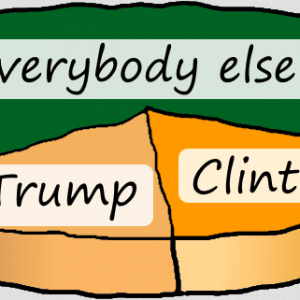 And in Michigan, a state Trump won by just 12,000 votes, some 17,000 opted for a little known Constitution Party contender by the name of Darrell Castle. Stein and Johnson together snagged a hefty 223,000 votes throughout The Wolverine State.
And in Michigan, a state Trump won by just 12,000 votes, some 17,000 opted for a little known Constitution Party contender by the name of Darrell Castle. Stein and Johnson together snagged a hefty 223,000 votes throughout The Wolverine State.
Then there’s Wisconsin. Clinton lost that state by 27,000 votes. But nearly 31,000 Wisconsinites chose another woman for job: Stein, who ran as the Green Party’s candidate.
Had all these third party voters voted instead for Hillary Clinton, Trump would be heading off to play golf in Scotland and tweeting how the election was rigged.
In the days after the Nov. 8 election, commentators like MSNBC’s Rachel Maddow and and New York Times columnist Paul Krugman insisted that third party voting was responsible for turning a former reality TV host into leader of the free world.
A lot of people everywhere are saying that.
They’re all wrong.
The main reason they’re wrong is because no one has any way of knowing for sure whether third party voters, if forced to choose between just the two major candidates, would have thrown their support behind Clinton. Or if they might not have voted at all.
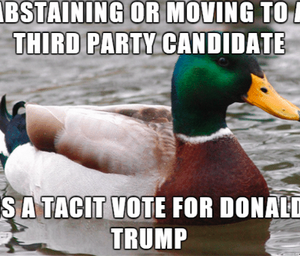 For sure third party votes were up on Nov. 8, 2016. Way up. In 2012, 1.9 million Americans cast “other” votes, compared to 4.7 million this year. That number is about equal to the number of voters who won Obama the election four years ago.
For sure third party votes were up on Nov. 8, 2016. Way up. In 2012, 1.9 million Americans cast “other” votes, compared to 4.7 million this year. That number is about equal to the number of voters who won Obama the election four years ago.
But be careful. Trying to draw conclusions about exactly how third party voters impacted the fortunes of either Trump or Clinton isn’t just dangerous. It’s illogical. And wrong.
Here’s why.
Statistics and Damned Statistics
One thing that may be getting people into logical trouble here is the weight they give personal experience and hearsay.
Throughout the bitter presidential campaign, anti-Trump voters were constantly being told, by the media and people on social, that “a vote for Johnson or Stein is a vote for Trump.”
And voters on the Trump side were getting deluged with the very same warning, only in reverse.
As for me, I had a lot of friends telling me that, because the polls showed that Clinton was an easy win in their
state, they were going to register a protest vote with a third party candidate — or, simply, that they might just vote for the candidate they liked better.
But this all anecdotal evidence. In no way is it statistically representative of what really happened on
Election Day.
Mystery voters or missing voters?
Record low turnout for the 2016 presidential elections is something you have to consider, too.
According to data compiled by the United States Election Project, nearly half of the nation’s eligible voters, some 231,556,622 people, didn’t even bother to show up.
And not voting is a protest vote, too.
Now, in some races, the thing came down to a handful of rural voters in small counties. New Hampshire was into double-digit disputes through much of the midnight hour, for example, as those small results trickled in.
Could things have broken a different way? Might Clinton have eked out a victory here and there? Or could Trump, who lost the popular vote, have won it if the voters who stayed home had come in and voted?
There’s no telling. It’s fruitless to talk counterfactuals.
As to whether the disappearance of Stein or Johnson from the ballot would’ve helped or harmed Trump or Clinton, there is no reason to presume that third party voters would or would
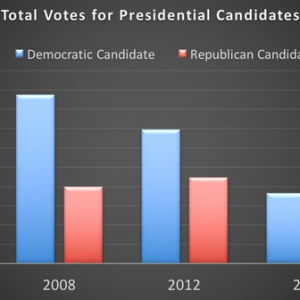
n’t have split evenly along the lines of distaste.
Winning
the big pot? It is pretty much a margins game.
These were two least popular presidential candidates in history.
Instead of blaming third party voters, blame that. Blame them.
Or, if you really feel the need to blame someone for the outcome of this election, give the Electoral College a long, hard look.
But in the popular vote, Clinton won with 47.7 percent (59,938,290 votes), compared to Trump’s 47.5 percent (59,704,886 votes). Whether you’re mad about Donald Trump not winning the popular vote because it undermines his mandate, or about Hillary’s winning it and not the big enchilada, the system itself is the the thing people really should be blaming.
As for those who are looking at pre-Election Day polls to make sense of all this, don’t bother.
And the only thing the polls tell us, really, is that the average American voted not to support their choice but to oppose the other one. Everyone knows that.
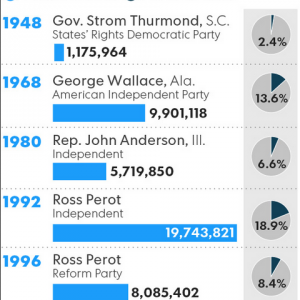 Here’s the upshot:
Here’s the upshot:
The main reason to stop blaming third party voters for this election’s outcome is that, on balance, the 4.7 million Americans responsible were actually a positive.
I defend third party candidates Johnson, Stein and the rest on those grounds, also. At least they gave voters a reason to show up.
Think about it. Without them, state and local ballots would’ve lost nearly five million voters,Americans who wouldn’t otherwise had the opportunity to weigh in on local races for senators and state houses, ballot initiatives, referenda, judges, mill levies, legal marijuana and taxes.
Even though they refused Trump and Clinton, the third party voters brought them in to consider all those choices and be heard, one way or another.
And remember, the more people who vote, the more the sample reflects the true will of the American people. And that’s what democracy is all about. That’s why voter repression is so pernicious. It directly undermines what we are aiming at here.
Shrinking the sample size only benefits extreme candidates to the exclusion of others.
So stop razzing your third party friends for destroying your candidate’s chances. Quit denouncing the whole group of them on Twitter and Facebook. And whatever you do, don’t thank them for getting your guy into office or securing your woman’s win of the popular vote.
Thank them for taking part at all.
And don’t cry too hard for the two major parties, either. Winning the big pot is a bit of a margins game. The parties know full well how to play.
As for me, I couldn’t be more grateful to third party voters. I live in Colorado, where every vote counted. So thanks.
For aNewDomain, I’m Jason Dias.
P.S. You might’ve heard, over Twitter or Facebook, than 11,000 to 15,000 American voters wrote in a the late Harambe the Gorilla for US president. That’s funny, but it’s fake news. Read Snopes’ debunking here.
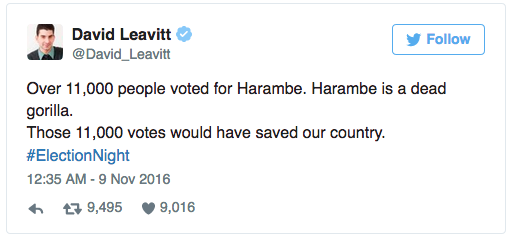
Cover image: inhomelandsecurity.com, All Rights Reserved;
Checkbox Other: Zyzmog.blogspot.com, All Rights Reserved; History of Third Party Candidates: USA Today, All Rights Reserved; Four candidates: NBCnews.com, All Rights Reserved; A third-party vote is a vote for Trump: OnSizzle.com, All Rights Reserved

